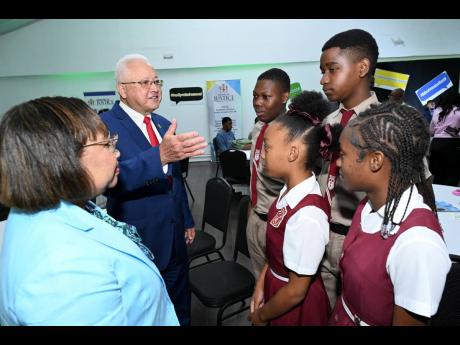Chuck: Law coming to ban corporal punishment in homes
The Government is on a mission to outlaw corporal punishment in homes, as it now is with schools islandwide.
The culture of beating children in schools has largely changed with legislation, strong enforcement and the intervention of the education ministry across administrations. That shift began in the last 30 years and Justice Minister Delroy Chuck is hoping this will soon filter into all homes islandwide.
“It is wrong! In other words, we must not use straps and whips and belts, especially belt buckles, to beat any child. Every parent must learn to scold the child, even to deprive the child of some form of activity or put them in the corner to stand up [is wrong], and I know it’s difficult for parents to really challenge their children to be on the right path, but I dare say that corporal punishment rarely works,” the minister said.
He made the comments on Wednesday while delivering the main address at the Ministry of Justice’s Child Diversion Forum at the Spanish Court Hotel in recognition of Child Month 2024, which is being celebrated in May.
“The Government intends to outlaw any form of corporal punishment. We have done so in the schools and we want to do it in the homes, because it is wrong, it doesn’t help the child and, as far as we’re concerned, it’s much better to speak, perhaps, in a strong language to the child, rather than to be slapping the child, pinching the child, twisting the child here, and using all sorts of punishment to get behaviour deemed appropriate by the parent,” he said.
In keeping with the theme for Child Month 2024, ‘Speak Up! Speak Out! Protect the Rights of our Children’, Chuck reiterated that corporal punishment should be a no-no in homes islandwide.
“One of the things I am begging students, yes, you must honour your mothers and fathers, but, tell them, they mustn’t hit you. In other words, we are against any form of punishment using a beating. It must not happen in the schools, but it must also not happen in the homes,” Chuck said.
Geneva Convention
The justice minister noted that children have a right to be protected from any form of violent behaviour, whether it comes from a teacher, a parent or any other child.
Additionally, this concept falls in line with the Geneva Convention on the Rights of the Child, which now marks its 35th anniversary since that universally accepted human rights instrument – which incorporates civil, political, economic, social and cultural rights – was merged into one document.
Chuck is hoping such a cultural shift will reduce children’s exposure to violence and abuse, and eventually ease the burden on the justice system with a reduction in the number of cases before the courts of minors committing violent offences.
“It’s not that fighting is a recent occurrence but, nowadays when people fight, they’re now fighting with weapons, fighting with knives and ice picks and compass and, God forbid, even guns and machetes!” Chuck, a former mathematics teacher, told the audience.
“And, once you pull a weapon, the end result is really serious; damage can be done. So we want to send the signal across Jamaica to urge students, please avoid the fighting,” he said.
He urged students to report their peers once they misbehave and engage in serious offences, and have them referred to a child diversion officer, who should meet with students and assess what form of psychological support and intervention is needed.
He also pleaded with youngsters who prefer to fight to find non-violent means of settling disputes.
“I know inside the schools you have challenges. I know it’s difficult when your fellow students provoke, tease you, trouble you and want to fight you, but, for God’s sake, don’t engage in counter-assault or a counter-abuse or feel that, because you’re so brave, you must stand up and fight back,” he said.
The Ministry of Justice previously entered into a memorandum of understanding with the Ministry of Education, using the Restorative Justice Programme to teach children non-violent techniques to resolve conflicts.

